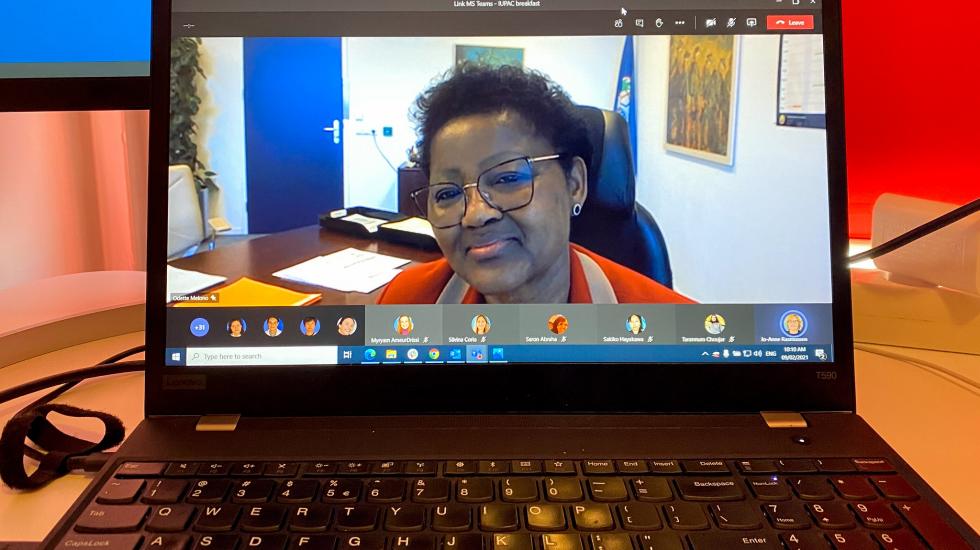
Female OPCW participate in IUPAC Global Women’s Breakfast to Support Diversity in Science.
THE HAGUE, Netherlands–9 February 2021–The Organisation for the Prohibition of Chemical Weapons (OPCW) facilitated a staff discussion today on achieving greater diversity in science. The online event formed part of the Global Women’s Breakfast initiative established by the International Union of Pure and Applied Chemistry (IUPAC).
Launched in 2019, IUPAC’s Global Women’s Breakfast aims to promote an on-going virtual network where women in the chemical and related sciences can connect to support their professional aspirations and develop leadership skills. This year’s theme was “Empowering Diversity in Science”.
In remarks to welcome participants to the online event, OPCW Deputy Director-General, H.E. Ambassador Odette Melono, expressed: “We live in an era in which science and technology are advancing at a faster pace than ever before; it is time that women’s empowerment in the scientific world travel at a similar speed.” She stressed: “Diversity provides a wonderful opportunity for us to share and learn from women across fields and at various stages of their careers. These different vantage points can provide enlightening perspectives on leadership and professional development.” Deputy Director-General Melono also described OPCW’s efforts to foster a diverse and inclusive working environment “where all employees are included, valued and empowered to contribute at their best”.
Almost 50 OPCW staff members discussed ways to strengthen diversity in the scientific community through research partnerships, mentoring programmes, as well as sharing educational resources and job opportunities.
The Global Women’s Breakfast, held two days before the United Nations Day of Women and Girls in Science, connects to Goal 5 of the United Nations Sustainable Development Goals: Achieve gender equality and empower all women and girls.
This year, over 300 events took place across the globe, inspired by IUPAC’s initiative. These were organised by women and men from high schools, universities, scientific societies, chemical industry, governments, and international organisations.

OPCW Deputy Director-General, H.E. Ambassador Odette Melono, during the IUPAC Global Women’s Breakfast to Support Diversity in Science.

Background
This is the second year the OPCW has participated in the IUPAC Global Women’s Breakfast. The OPCW is committed to gender equality and providing equal opportunities for everyone, and demonstrates this commitment in a variety of ways:
- The Director-General of the OPCW, H.E. Mr Fernando Arias, joined the International Gender Champions, a global network of over 250 decision-makers committed to improving gender equality in their organisations, in 2018.
- The OPCW has appointed Gender Focal Points in each Division of the OPCW to promote gender equality and ensure gender mainstreaming throughout the Organisation. Work-life balance arrangements have also been made available to all staff to foster an equitable and inclusive work environment.
- The OPCW has achieved gender parity in its senior management structure and is working towards gender balance across the whole Organisation.
- A series of webinars and trainings on gender in disarmament, gender mainstreaming, and diversity and inclusion has furthered understanding of these issues among OPCW staff.
- The OPCW holds an annual Women in Chemistry Symposium, which explores opportunities and challenges for women working in the chemical sciences, academia, and industry.
As the implementing body for the Chemical Weapons Convention, the OPCW, with its 193 Member States, oversees the global endeavour to permanently eliminate chemical weapons. Since the Convention’s entry into force in 1997, it is the most successful disarmament treaty eliminating an entire class of weapons of mass destruction.
Over 98% of all declared chemical weapon stockpiles have been destroyed under OPCW verification. For its extensive efforts in eliminating chemical weapons, the OPCW received the 2013 Nobel Peace Prize.
